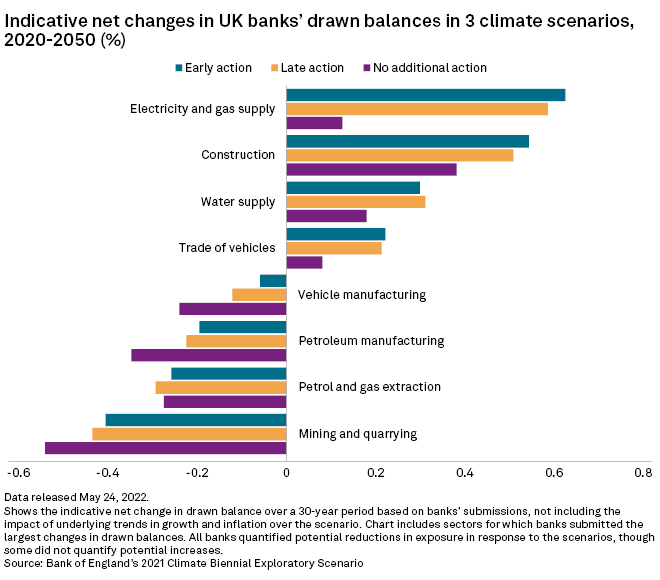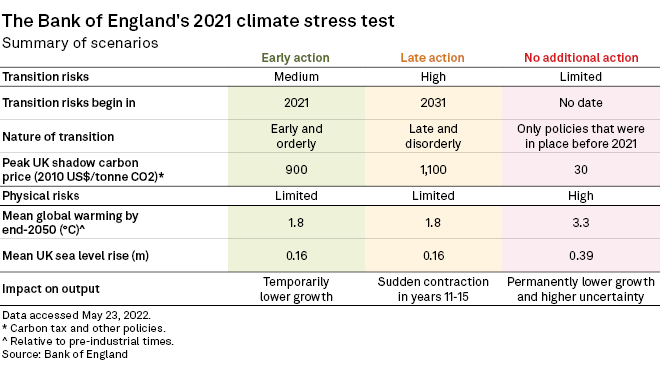S&P Global Offerings
Featured Topics
Featured Products
Events
S&P Global Offerings
Featured Topics
Featured Products
Events
S&P Global Offerings
Featured Topics
Featured Products
Events
Banking & Capital Markets
Economy & Finance
Energy Transition & Sustainability
Technology & Innovation
Podcasts & Newsletters
Banking & Capital Markets
Economy & Finance
Energy Transition & Sustainability
Technology & Innovation
Podcasts & Newsletters
S&P Global Offerings
Featured Topics
Featured Products
Events
4 Oct, 2022

By Sanne Wass
Banks risk causing economic shocks if they withdraw funding from polluting sectors too quickly, the Bank of England's head of climate has warned.
Speaking at The Economist's annual Sustainability Week on Oct. 3, Chris Faint suggested that financial institutions should resist external pressure to withdraw funding from high-carbon clients as they execute their climate strategies.
"Some commentators are agitating for a sudden removal of capital or investment from more polluting sectors and the instant rechanneling of that into green activities. But we caution against this," Faint said.
Financial institutions should be making decisions "from a whole economy perspective" and evolving their lending "at a fast enough speed to facilitate the transition, but not in a way that is too fast or disorderly that it creates additional risks," Faint said.
Some 117 banks globally have signed up for the Net-Zero Banking Alliance, committing to reach net-zero emissions by 2050 across their lending portfolios and to set interim decarbonization targets.
Meanwhile, campaigners and shareholder groups have criticized banks' continued financing of major fossil fuel companies, saying it is a clear contravention of climate science and is against lenders' own pledges.
"Of course, it's essential that we fund the transition and move away from more polluting sectors. But defunding certain sectors too quickly at a point where substitutes are not available could create a disorderly transition and a potential shock to the system," Faint said.

U.K. banks plan to reduce their exposure to carbon-intensive sectors toward 2050 across different climate scenarios. The largest cuts are projected in the petroleum and gas extraction, petroleum manufacturing, and mining and quarrying sectors, the Bank of England's latest climate stress test found. These strategies "raise the possibility that some corporate sectors may struggle to access finance as the transition progresses, especially from banks," the Bank of England said when it released the results in May.
The exercise assessed seven banks — HSBC Holdings PLC, Barclays PLC, Lloyds Banking Group PLC, NatWest Group PLC, Standard Chartered PLC, Nationwide Building Society and the U.K. branch of Banco Santander SA — under three stress scenarios: early, late or no additional action against climate change.
Banks may decide to exit polluting clients due to risk considerations, external pressures or in order to meet their targets, Faint said. "The risk is that each of these decisions make sense in isolation based upon each institution's internal deliberations. But at the system level, when you add them all up, it could give rise to sudden cliff edges in terms of funding, and that, in time, could give greater shocks in the system."
Transition clarity needed
To avoid a disorderly transition, banks need better clarity over what the pathway to net-zero will look like, Faint said.
"In an ideal world, we would have government policy clarity for the whole period of transition," he said. "But as we've seen with recent energy price shocks, pragmatically, there's going to be significant barriers to being able to provide clarity on what that transition looks like for the short term."
Regulators, meanwhile, can help to build market practices around, for example, transition plans and disclosures, to give financial institutions a better understanding of the speed of the transition and allow them to create "appropriate funding schemes" for polluting clients, Faint said.

Faint praised efforts internationally to coordinate regulatory measures to address climate risk, including work by the Basel Committee on Banking Supervision and the Financial Stability Board.
The Network of Central Banks and Supervisors for Greening the Financial System, or NGFS, has also worked to design hypothetical scenarios from climate change and policy that public and private sectors can use in their decision-making. The initiative now consists of 116 central banks and financial supervisors.
Supervisors including the Bank of England and the European Central Bank have begun stress testing large banks against NGFS-based scenarios. The U.S. Federal Reserve, which is also a member of NGFS, recently announced it would conduct a climate scenario analysis involving Bank of America Corp., Citigroup Inc., The Goldman Sachs Group Inc., JPMorgan Chase & Co., Morgan Stanley and Wells Fargo & Co.
"As I look at the developments over the last three years in the international regulatory space, I think it's relatively unprecedented for there to have been so much movement so quickly," said Faint. "Now, does more need to be done? Absolutely."
The Glasgow Financial Alliance for Net Zero, a coalition of seven financial sector climate alliances including the Net-Zero Banking Alliance, has also sought to alleviate mounting pressure on financial institutions to withdraw finance from high-carbon sectors. It recently released guidance on how banks can deal with high-emitting assets while aligned with a net-zero strategy.
